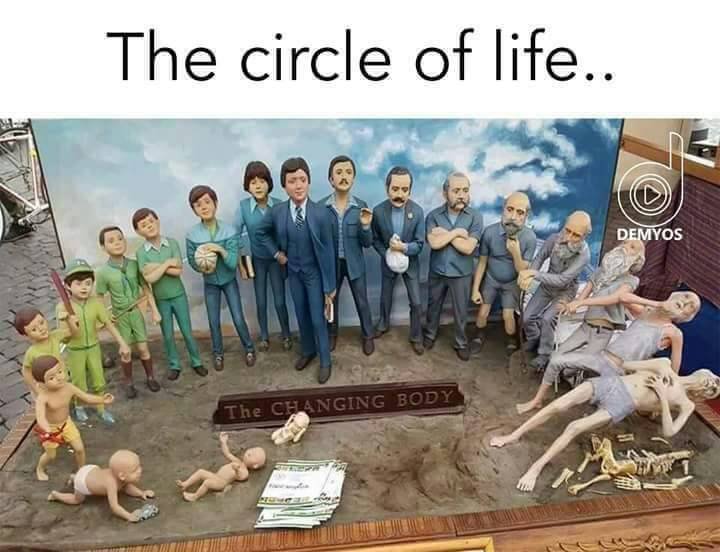Each stage of life has its own unique “gift” to contribute to the world. We need to value each one of these gifts if we are to truly support the deepest needs of human life. Here are what I call the twelve gifts of the human life cycle:

- Prebirth: Potential – The child who has not yet been born could become anything – a Michelangelo, a Shakespeare, a Martin Luther King – and thus holds for all of humanity the principle of what we all may yet become in our lives.
- Birth: Hope – When a child is born, it instills in its parents and other caregivers a sense of optimism; a sense that this new life may bring something new and special into the world. Hence, the newborn represents the sense of hope that we all nourish inside of ourselves to make the world a better place.
- Infancy (Ages 0-3): Vitality – The infant is a vibrant and seemingly unlimited source of energy. Babies thus represent the inner dynamo of humanity, ever fueling the fires of the human life cycle with new channels of psychic power.
- Early Childhood (Ages 3-6): Playfulness – When young children play, they recreate the world anew. They take what is and combine it with the what is possible to fashion events that have never been seen before in the history of the world. As such, they embody the principle of innovation and transformation that underlies every single creative act that has occurred in the course of civilization.
- Middle Childhood (Ages 6-8): Imagination – In middle childhoood, the sense of an inner subjective self develops for the first time, and this self is alive with images taken in from the outer world, and brought up from the depths of the unconscious. This imagination serves as a source of creative inspiration in later life for artists, writers, scientists, and anyone else who finds their days and nights enriched for having nurtured a deep inner life.
- Late Childhood (Ages 9-11): Ingenuity – Older children have acquired a wide range of social and technical skills that enable them to come up with marvelous strategies and inventive solutions for dealing with the increasing pressures that society places on them. This principle of ingenuity lives on in that part of ourselves that ever seeks new ways to solve practical problems and cope with everyday responsibilities.
- Adolescence (Ages 12-20): Passion – The biological event of puberty unleashes a powerful set of changes in the adolescent body that reflect themselves in a teenager’s sexual, emotional, cultural, and/or spiritual passion. Adolescence passion thus represents a significant touchstone for anyone who is seeking to reconnect with their deepest inner zeal for life
- Early Adulthood (Ages 20-35): Enterprise – It takes enterprise for young adults to accomplish their many responsibilities, including finding a home and mate, establishing a family or circle of friends, and/or getting a good job. This principle of enterprise thus serves us at any stage of life when we need to go out into the world and make our mark.
- Midlife (Ages 35-50): Contemplation – After many years in young adulthood of following society’s scripts for creating a life, people in midlife often take a break from worldly responsibilities to reflect upon the deeper meaning of their lives, the better to forge ahead with new understanding. This element of contemplation represents an important resource that we can all draw upon to deepen and enrich our lives at any age.
- Mature Adulthood (Ages 50-80): Benevolence – Those in mature adulthood have raised families, established themselves in their work life, and become contributors to the betterment of society through volunteerism, mentorships, and other forms of philanthropy. All of humanity benefits from their benevolence. Moreover, we all can learn from their example to give more of ourselves to others.
- Late Adulthood (Age 80+): Wisdom – Those with long lives have acquired a rich repository of experiences that they can use to help guide others. Elders thus represent the source of wisdom that exists in each of us, helping us to avoid the mistakes of the past while reaping the benefits of life’s lessons.
- Death & Dying: Life – Those in our lives who are dying, or who have died, teach us about the value of living. They remind us not to take our lives for granted, but to live each moment of life to its fullest, and to remember that our own small lives form of a part of a greater whole.
Since each stage of life has its own unique gift to give to humanity, we need to do whatever we can to support each stage, and to protect each stage from attempts to suppress its individual contribution to the human life cycle.
[References](The Human Odyssey: Navigating the Twelve Stages of Life.)
Hi! I am a robot. I just upvoted you! I found similar content that readers might be interested in:
http://www.institute4learning.com/resources/articles/the-12-stages-of-life/
Thanks for being here!!Congratulations @drekkelly: this post has been upvoted by @minnowhelpme!!This is a free upvote bot, part of the project called @steemrepo , made for you by the witness @yanosh01.
Peace, Abundance, and Liberty Network (PALnet) Discord Channel. It's a completely public and open space to all members of the Steemit community who voluntarily choose to be there.Congratulations! This post has been upvoted from the communal account, @minnowsupport, by drekkelly from the Minnow Support Project. It's a witness project run by aggroed, ausbitbank, teamsteem, theprophet0, someguy123, neoxian, followbtcnews, and netuoso. The goal is to help Steemit grow by supporting Minnows. Please find us at the
If you would like to delegate to the Minnow Support Project you can do so by clicking on the following links: 50SP, 100SP, 250SP, 500SP, 1000SP, 5000SP.
Be sure to leave at least 50SP undelegated on your account.